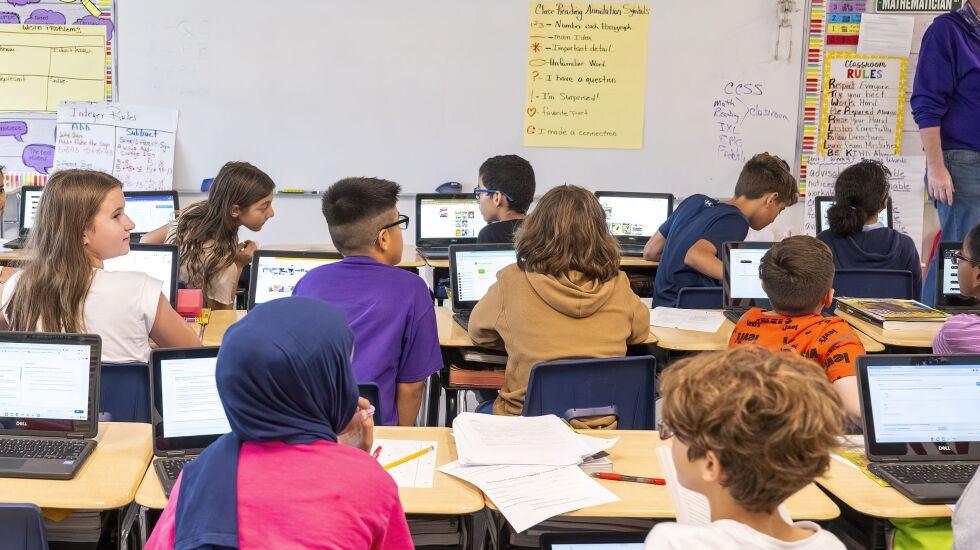
The Sun-Times editorial opposing pay for elected school board members encourages perpetuating a system that undermines public service and fair representation of all communities (“Say no to pay for Chicago school board members” — Oct. 30).
Those who pursue elected office do so to serve the public and, in the case of many Latinos, to be a voice for underrepresented communities — and they do so at a considerable personal cost.
Serving in public office today is a rigorous sacrifice. Done well, it involves long hours and has been made more difficult by the impact of the pandemic and the contempt that many members of the public have developed for their elected representatives.
SEND LETTERS TO: letters@suntimes.com. We want to hear from our readers. To be considered for publication, letters must include your full name, your neighborhood or hometown and a phone number for verification purposes. Letters should be a maximum of approximately 375 words.
NALEO has observed a generation of elected officials opting to leave public service today because of the toll on their well-being, families and personal finances when the positions are unpaid.
Requiring elected officials to be compensated merely with modest stipends and expense reimbursements promotes a system in which only those who are independently wealthy and do not need to hold a full-time job to support their families and themselves are the ones who can afford to serve in such roles — further stifling the voices of the most underrepresented.
Arturo Vargas, CEO, NALEO and NALEO Educational Fund, Los Angeles
Donors can keep funding private school scholarships for kids
In her Nov. 9 article about the sunset of the Invest in Kids school voucher program, Mawa Iqbal cites information provided by Empower Illinois and other voucher supporters that hundreds of students will lose their scholarships for the 2024-25 school year, “interrupting their education and creating instability for their families.”
The reality, however, is that the end of the Invest in Kids Act does nothing of the sort.
The generous donors who want to support scholarships for non-public schools can still make their donations, and they can even receive a federal, charitable tax deduction if their donations are made to eligible institutions. And those donations can still support students whose families may not be able to afford the private or religious school tuition. None of that has changed.
The only difference is that without Invest in Kids, the donors do not get an Illinois tax credit— a direct reduction in the state income tax they pay. Those funds came right out of the Illinois General Fund that supports public schools and other needs.
Ending Invest in Kids also saves 5% of the donations, which were directed to the scholarship-granting organizations, like Empower Illinois, that administered the program. This past year, that 5% amounted to over $2.5 million which otherwise could have supported children. Some of that 5% was used to purchase T-shirts and lawn signs, and charter busloads of students to travel to Springfield to lobby on behalf of the vouchers.
Sadly, those children and their families were wrongly scared into believing that their scholarships would end without Invest in Kids. But the Big Shoulders Fund, one of the organizations that distributed Invest in Kids scholarships, famously has provided scholarships for students to attend Chicago Archdiocese schools for decades (before Invest in Kids was started). There is no reason that has to change without Invest in Kids.
Invest in Kids trampled upon one of the most fundamental principles of our country: the separation of church and state. There were also concerns about accountability and discrimination among the receiving schools. Not enough funds went to schools in high-poverty neighborhoods.
The Illinois Legislature deserves kudos for resisting the intense pressure to extend the Invest in Kids Act from groups benefiting from its funding. With that action, legislators reaffirmed core American principles and values and pushed back against those who prefer a privatized and dismantled public school system in Illinois. And, if the donors of the Invest in Kids scholarships continue to live up to their beliefs about supporting private and religious education, not a single student needs to lose their scholarship.
Martin Gartzman, Edgewater
GOP undermines public schools
I found the Sun-Times article on the sunsetting of the “Invest in Kids” voucher program disturbingly one-sided. One parent of a beneficiary of the program was quoted extensively (Illinois’ controversial private school scholarship program is ending — Nov. 9).
What about all the parents whose kids attend underfunded public schools (where teachers are forced to buy needed supplies out of their own pockets)? Wouldn’t their opinions be worthy of printing too?
It costs money to send buses to Springfield to campaign for the continued diversion of public school funding to private and parochial schools. I have an idea for all the rich Republican funders of this campaign to further destroy the public schools. They should satisfy their urge to help deserving low-income students by spending their own funds on scholarships for them, instead of campaigning to raid the public treasury for that purpose.
Steven M. Cohen, Tucson, Arizona
No jail for man accused of felonies?
I have to ask how many major felonies must one commit to be put in jail for more than a half hour? In the Tuesday paper, you reported Gustavo Belleza was arrested Nov. 7 and charged with more than 15 burglaries and mail thefts (“Chicago man faces more than a dozen felonies, accused of Lincoln Park mail theft, burglaries”).
He was found with fake IDs and 65 bank cards with victims’ names. He was arrested again Nov. 20. Somehow, 15 burglaries and mail thefts, all of which are major felonies and mostly federal crimes, didn’t meet the judge’s criteria for throwing this guy in jail Nov. 7. The report didn’t state if the judge jailed him for his latest crime spree.
Again, what does it take to put these crooks behind bars?
Tom Sharp, Uptown







